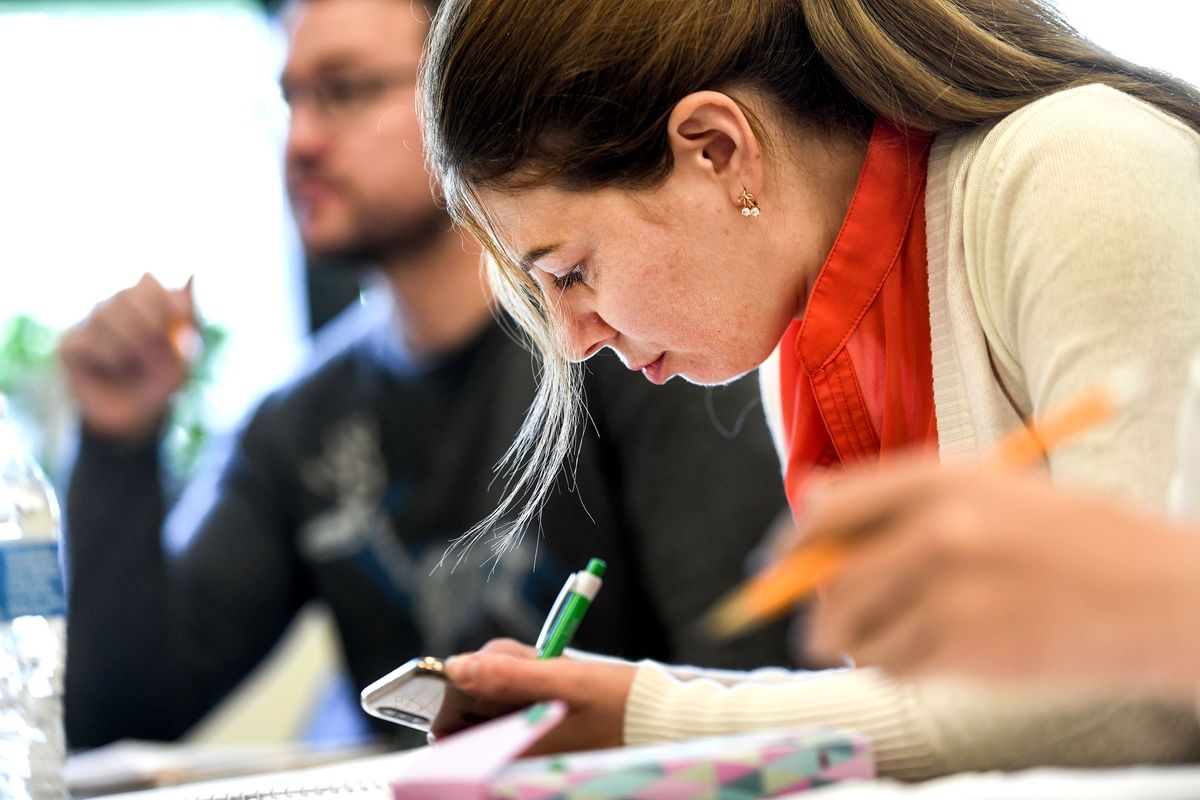Surviving Spokane 101: SCC’s English as a second language classes see enrollment spike with Ukrainian, Afghani refugees

Logan Amstadter and other English as a second language faculty at Spokane Community College knew going into this year that the college needed a class dedicated to teaching adults things they should know when living in America.
What they didn’t know was that a good number of their first students would be refugees from a war-torn Ukraine.
ESL faculty began in earnest to prepare the new adult basic education curriculum last fall. This was just as enrollment spiked with Afghan refugees following the U.S. withdrawal from Afghanistan.
Whereas most ESL programs are designed to prepare students for college, Amstadter said the new “community track” class launched this spring is built for students of any learning level, with open enrollment at any time.
Parts of the curriculum dive into subjects like how to invest and setting five-year goals – topics, she said, that don’t feel especially relevant to her Ukrainian students at the moment.
“They’re in crisis mode,” she said. “Many of them don’t even know whether they’re going to stay or they’re going to go back if they get the chance. So really, it has become a class where we address these life skills, but it’s super flexible.
“But like the stock market, they don’t need to learn about that right now,” she continued. “They just want to know how to get life set up in Spokane and how to survive here.”
Ukrainian and Afghan refugees each account for about 37% of the 662 students enrolled in spring ESL classes, said Sherri Fujita, SCC’s dean of Adult Basic Education. Students from Mexico and Central and South America make up the next highest demographic at 15%.
SCC’s Adult Basic Education classes are “basically free,” funded by a combination of state and federal grants, Fujita said. There’s a $25 mandatory tuition, but that is often waived through financial assistance.
The Ukrainians are generally well-situated in their lives, she said, as most came to Spokane with their own funds to stay with family or other relatives. Many have high school diplomas and some have college degrees.
Meanwhile, Fujita said a lot of the Afghan refugees – especially the women – have never had any formal schooling.
The ESL program will serve any student who needs basic language training so long as they are a state resident, Fujita said. They’ve done so this spring with more than double the number of students who were enrolled last year, marking a return to pre-COVID-19 pandemic enrollment levels.
Instructors have found that some of the refugee students who have come from traumatic situations can be easily triggered. Fujita said this has caused some challenges even with what had been routine affairs, such as lockdown drills.
“Little things like that, we have to be careful about,” Fujita said, “but for the most part, I think the students, they come because of the community and they come to make the connections. We try to make it a place where they can just relax and be themselves.”
The community track classes revolve around five units: health, housing, financial literacy, employment and student success.
While Amstadter’s community track class on a recent Wednesday evening was centered on financial literacy, students learn about more than just terms related to loans, credit cards and investments.
Amstadter and students also talked through the meanings of words, like risky and ache. Phonics helped explain how a share – of stock, in this case – is different than a chair.
“The biggest thing is to kind of broker American culture as much as we can and help them out with their most common issues, like trying to find an apartment, treating them with dignity and just being a welcoming environment for them,” she said. “Whenever the conversation veers into something interesting and they’re having fun with, I go with that.”
Learning English by experience is partly why Serge Snihurov and Alona Snihurova said they appreciate the class so much.
Snihurov, 34, and his wife Snihurova, 32, signed up for the ESL class a few weeks ago, not long after the Ukrainian natives made their way to the United States due to the war with Russia.
The two left their home in Odesa in February, fleeing first to Moldova in hopes of a quick end to the war. When that didn’t happen, they went to Germany, where they stayed before connecting with some friends in Spokane, who covered their airfare, they said.
It’s been “very hard for us,” Snihurova said, as they are worried about their immediate families and other relatives who are still in Ukraine.
“A lot of people lost (their) house, lost relatives, lost jobs,” Snihurov said. “They don’t have money. They don’t have food. They live in the subway, in the underground, because it’s dangerous.”
“It was very bad for me,” added Snihurova, 32, saying that the start of the war “stopped life.”
The two said they have come to enjoy Spokane, having recently secured their own apartment and getting situated with food stamps.
In Odesa, Snihurov studied as a construction engineer, while Snihurova said she worked in mall management.
“Our dream is to speak English as our native language,” Snihurov said. “Now, it’s our new home.”